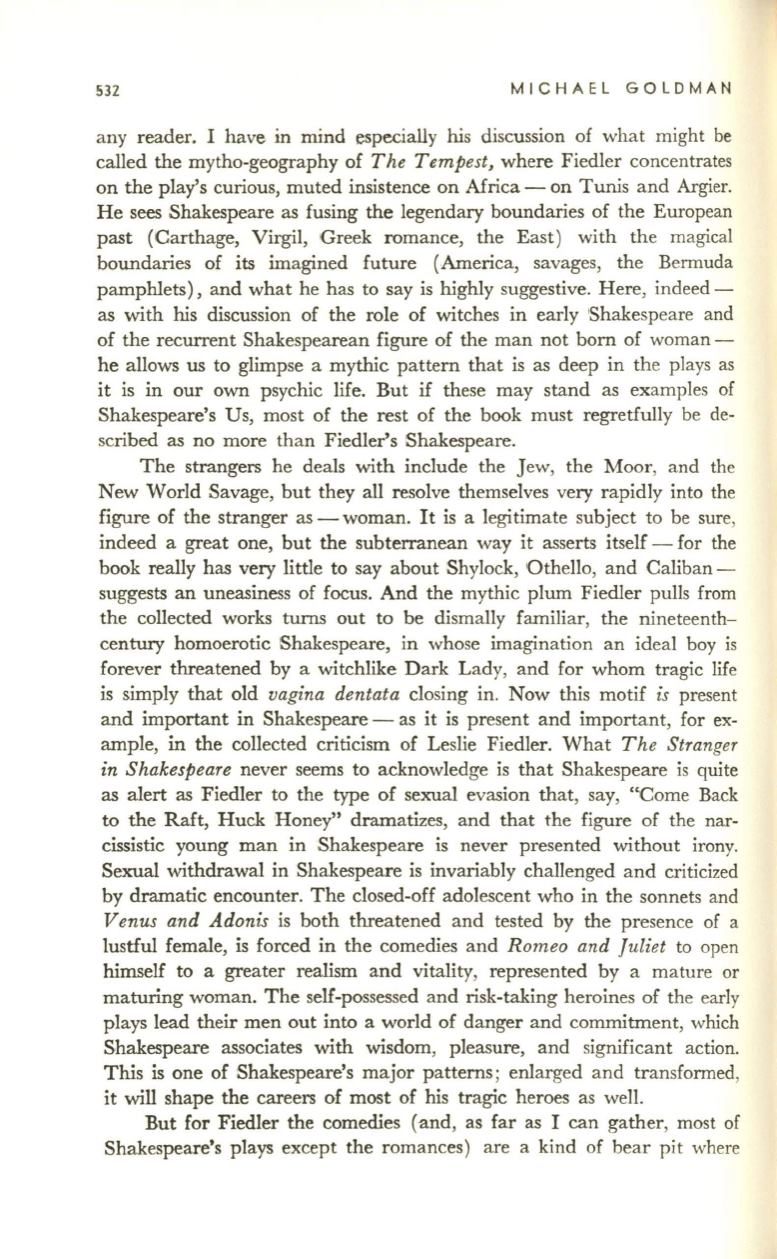
532
MICHAEL GOLDMAN
any reader. I have in mind especially his discussion of what might be
called the mytho-geography of
The Tempest,
where Fiedler concentrates
on the play's curious, muted insistence on Africa - on Tunis and Argier.
He sees Shakespeare as fusing the legendary boundaries of the European
past (Carthage, Virgil, Greek romance, the East) with the magical
boundaries of its imagined future (America, savages, the Bermuda
pamphlets), and what he has to say is highly suggestive. Here, indeed–
as with his discussion of the role of witches in early 'Shakespeare and
of the recurrent Shakespearean figure of the man not born of woman–
he allows us to glimpse a mythic pattern that is as deep in the plays as
it is in our own psychic life. But
if
these may stand as examples of
Shakespeare's Us, most of the rest of the book must regretfully be de–
scribed as no more than Fiedler's 'Shakespeare.
The strangers he deals with include the Jew, the Moor, and the
New World Savage, but they all resolve themselves very rapidly into the
figure of the stranger as - woman. It is a legitimate subject to be sure,
indeed a great one, but the subterranean way it asserts itself - for the
book really has very little to say about Shylock, Othello, and Caliban–
suggests an uneasiness of focus. And the mythic plum Fiedler pulls from
the collected works turns out to be dismally famili ar, the nineteenth–
century homoerotic Shakespeare, in whose imagination an ideal boy is
forever threatened by a witchlike Dark Lady, and for whom tragic life
is simply that old
vagina dentata
closing in. Now this motif
is
present
and important in Shakespeare - as it is present and important, for ex–
ample,
in
the collected criticism of Leslie Fiedler. What
The Stranger
in Shakespeare
never seems to acknowledge is that Shakespeare is quite
as alert as Fiedler to the type of sexual evasion that, say, ''Come Back
to the Raft, Huck Honey" dramatizes, and that the figure of the nar–
cissistic young man in Shakespeare is never presented without irony.
Sexual withdrawal in Shakespeare is invariably challenged and criticized
by dramatic encounter. The closed-off adolescent who in the sonnets and
Venus and Adonis
is both threatened and tested by the presence of a
lustful female, is forced in the comedies and
Romeo and Juliet
to open
himself to a greater realism and vitality, represented by a mature or
maturing woman. The self-possessed and risk-taking heroines of the early
plays lead their men out into a world of danger and commitment, which
Shakespeare associates with wisdom, pleasure, and significant action.
This is one of Shakespeare's major patterns ; enlarged and transformed,
it will shape the careers of most of his tragic heroes as well.
But for Fiedler the comedies (and, as far as I can gather, most of
Shakespeare's plays except the romances) are a kind of bear pi t where


